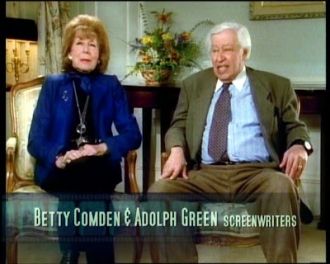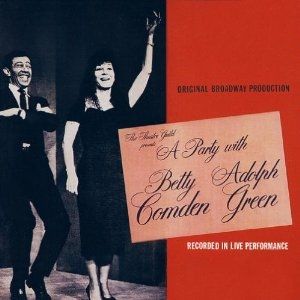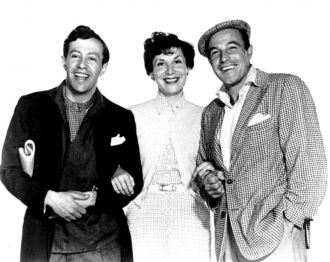Betty Comden, Lyricist for Musicals, Dies at 89.
Betty Comden, who with her longtime collaborator Adolph Green wrote the lyrics and often the librettos for some of the most celebrated musicals of stage and screen, died today at NewYork-Presbyterian Hospital. She was 89 and lived in Manhattan.
The cause was heart failure, said Ronald Konecky, her lawyer and the executor of her estate. During a professional partnership that lasted for more than 60 years, and which finally ended with Mr. Green’s death in 2002, the Comden-Green blend of sophisticated wit and musical know-how lit up stage shows like “On the Town,” “Wonderful Town,” “Peter Pan” and “Bells Are Ringing.” Their Hollywood credits included the screenplays for two landmark film musicals, “Singin’ in the Rain” and “The Band Wagon.” Through the years, they worked with composers like Leonard Bernstein, Cy Coleman, Jule Styne and André Previn, creating songs like “New York, New York,” “The Party’s Over,” “It’s Love” and “Some Other Time.” They were adept at making their lyrics fit the mood, whether it was rueful (“Lonely Town”), raucous (“100 Easy Ways to Lose a Man”) or romantic (“Just in Time”). The title of one of their own songs, from “Bells Are Ringing,” summed up their joint career: it was truly a “Perfect Relationship” in which they met daily, most often Ms. Comden’s living room, either to work on a show, to trade ideas or even just talk about the weather.
Hollywood called again and this time, for the most part, they had better luck. “Good News” (1947), with June Allyson and Peter Lawford as singing, dancing campus sweethearts, was their first screenplay. They wrote “The Barkleys of Broadway” (1949), which marked the film reunion of Ginger Rogers and Fred Astaire, and adapted “On the Town” (1949) for the screen, with Gene Kelly, Frank Sinatra and Jules Munshin as the freewheeling sailors navigating the streets of New York. They contributed heavily to the success of “The Band Wagon” (1953), the Vincente Minnelli musical for which they wrote the witty screenplay. The film had a score by Howard Dietz and Arthur Schwartz and starred Mr. Astaire, Cyd Charisse, Oscar Levant and Nanette Fabray. The Comden-Green screenplay received an Academy Award nomination.
They were still wedded to Broadway, however, and their stage work during the next few years included the Jule Styne musical “Two on the Aisle” (1951), a revue with Bert Lahr and Dolores Gray; “Wonderful Town” (1953), an adaptation of the 1939 comedy hit “My Sister Eileen,” with music by Mr. Bernstein and starring Rosalind Russell and Edie Adams as two sisters from Ohio trying to make it in the Big Town; and, most notably, “Bells Are Ringing.”
That 1956 musical reunited them with Ms. Holliday, who headed the cast as an operator at an answering service who falls in love with one of the service’s male clients (Sydney Chaplin), after listening to his voice over her telephone line. The score included the comic lament “I’m Going Back (To the Bonjour Tristesse Brassiere Company)” as well as some songs that became part of the standard pop repertory, like “Just in Time,” “Long Before I Knew You” and “The Party’s Over,” which ended with the melancholy verse:
Now you must wake up
All dreams must end
Take off your make-up
The party’s over
It’s all over, my friend.
Ms. Comden and Mr. Green also wrote the screenplay for the 1960 film version, which starred Ms. Holliday.
Even their less successful shows yielded musical nuggets, one example being the 1960 “Do Re Mi,” which had a book by Garson Kanin, music by Mr. Styne for which they wrote the lyrics, and which featured Phil Silvers and Nancy Walker. That largely unmemorable score included one gem, “Make Someone Happy.”
Ms. Comden and Mr. Green went on to write “Subways Are for Sleeping” (1961), with Carol Lawrence and Mr. Chaplin, and “Fade Out-Fade In” (1964), with Carol Burnett and Jack Cassidy, both shows with music by Mr. Styne; the lyrics for “Hallelujah, Baby” (1968), which had music by Mr. Styne, a book by Arthur Laurents and which starred Leslie Uggams and Robert Hooks, and then wrote the book for “Applause” (1970). Adapted from the film “All About Eve,” with music by Charles Strouse and lyrics by Lee Adams, the show starred Lauren Bacall as the take-no-prisoners movie queen Margo Channing played by Bette Davis in the film.
In the years that followed they teamed up with the composer Cy Coleman for “On the Twentieth Century” (1978), based on the Ben Hecht-Charles MacArthur play about a flamboyant movie producer (John Cullum) and his leading lady (Madeline Kahn), traveling from Hollywood to Broadway on the Twentieth-Century Limited in the 1930s. The show was a hit and brought them Tony Awards for their book and score. In 1982 they wrote the book and lyrics — Larry Grossman wrote the music — for what was meant to be a kind of musical sequel to Ibsen’s “A Doll’s House,” but the result, “A Doll’s Life” (1982), was a four-performance disaster.
Their last major Broadway show was “The Will Rogers Follies,” a 1991 Ziegfeld-style extravaganza with music by Mr. Coleman, book by Peter Stone and direction and choreography by Tommy Tune. Keith Carradine starred as the folksy humorist-philosopher. Despite mixed reviews the show won six Tony Awards, including one for the music and lyrics, and enjoyed a run of two and a half years.
By the time “Will Rogers” came along, Ms. Comden and Mr. Green had worked together for more than a half-century. On Broadway, starting with “On the Town” in 1944, they had won a shelf full of Tony Awards. In 1991 they were among the recipients of that year’s Kennedy Center honors for their contributions to American musical theater.
Their early Hollywood credits included “Take Me Out to the Ball Game” (1949), with Gene Kelly, Frank Sinatra and Esther Williams, and “It’s Always Fair Weather” (1955), with Mr. Kelly, Dan Dailey, Michael Kidd and Ms. Charisse, for which their screenplay received an Academy Award nomination. A bittersweet sequel of sorts to “On the Town,” the plot of “It’s Always Fair Weather” revolved around the reunion a decade after World War II of three former G.I. companions who find that time has altered their friendship for the worse. “I don’t think there’s ever been a musical quite like it,” Ms. Comden said in a 1999 interview with The Times. “The corrosive effect that time has on friendships — that’s a very unusual subject for a musical.” She and Mr. Green said it was one of their favorites.
After their stage debut in “On the Town,” they didn’t perform on Broadway again until 1958, when they appeared in “A Party with Betty Comden and Adolph Green,” a revue that included some of their early favorites like “The Baroness Bazuka,” which they described as a tribute to the Shubert brothers (“J. J., O. O., and Uh-Uh.”). The revue was well received and they brought an updated version back to Broadway in 1977.
In 1999 Ms. Comden and Mr. Green were saluted by their peers in a two-night program at Carnegie Hall. Elaine Stritch and Brian Stokes Mitchell were among the performers who sang numbers from the Comden-Green repertoire.
Recent Broadway revivals of their work included a 2001 production of “Bells Are Ringing” starring Faith Prince, which closed after a brief run, and the 2003 revival of “Wonderful Town” with Donna Murphy, which settled in for a long stay at the Al Hirschfeld Theater. After Mr. Green’s death in October 2002, Broadway turned out in force two months later for a memorial program at the Shubert Theater. Kevin Kline, Joel Grey, Ms. Bacall and others paid affectionate tribute to Mr. Green in song and story. At one point during her own reminiscence about Mr. Green, Ms. Comden paused and said to the audience, “It’s lonely up here.” After six decades, the perfect relationship was over.









